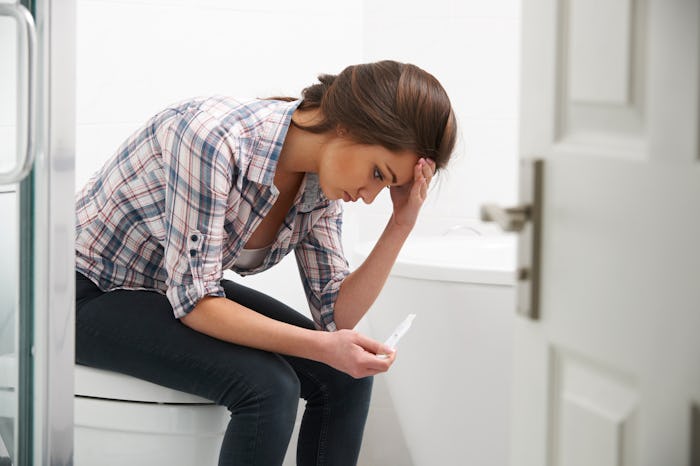Life

How You Get Pregnant If You Have Endometriosis, Because It's Not Exactly Easy
Women have long been stigmatized by the physical and mental symptoms of their menstrual cycle. Whether dismissed as "hysterical" or shamed for being "gross," many decide to suffer in silence rather than risk being perceived as weak. This is especially true when it comes to diseases like endometriosis, a painful inflammatory condition that is hard to diagnose. Luckily, the condition is more well known than it used to be, and if you hope to have children, you'll need to know how you get pregnant if you have endometriosis.
It's not impossible, though your chances will be affected by factors like your age and the severity of your condition. And in some cases, pregnancy may actually help alleviate the symptoms of endometriosis, as Lena Dunham wrote in "The Sickest Girl," sharing the advice of an ultrasound tech during one of Dunham's vaginal ultrasounds. To better understand the relationship between fertility and endometriosis, which doesn't get a lot of press even though so many women suffer from it, Romper spoke with two OB-GYNs with expertise on this painful disease.
Dunham may be the most public face of endometriosis (also referred to as "endo"), but this chronic inflammatory disease impacts a whopping "one in 10 women of childbearing age," according to The Guardian. If you've been newly diagnosed with endometriosis, or are wondering if you have it, it's helpful to understand the causes and symptoms of endo. According to Dr. Gerardo Bustillo of Orange Coast Memorial Medical Center in Fountain Valley, California, "Endometriosis, defined as endometrial (uterine lining) tissue occurring outside the uterine cavity, is an inflammatory disease which may affect women in all stages of their reproductive lives. It peaks in incidence in women 25 to 35 years of age." He adds that inflammatory changes caused by the disease result in two common symptoms: pelvic pain and decreased fertility.
Before diagnosis, many women with endometriosis may think they just have really painful periods, but that isn't the case. As Dunham describes in her intimately detailed essay on the topic, endometriosis can be so debilitating that it causes you to miss work and social events, and makes sex so painful you'd rather not bother. (Which isn't great for trying to conceive.) Dr. Marc Winter of Saddleback Memorial Medical Center in Laguna Hills, California, confirms that "pain with intercourse" is a symptom of endometriosis.
Unfortunately, all the evidence of endometriosis is inside your body, so it isn't easy to diagnose. Many women go misdiagnosed or undiagnosed for years, and the validity of their experiences is questioned.
Diagnosing endometriosis, Bustillo explains, requires "direct visualization and biopsy of endometriosis implants in the pelvis at the time of laparoscopic surgery." During the surgery, your stage of endometriosis will be identified. Bustillo advises that "although the stage of endometriosis does not necessarily correlate with the severity of pelvic pain, more advanced stages of endometriosis are definitely associated with a poorer prognosis for fertility and fertility treatments." Women who undergo laparoscopic surgery and have some or all of their endometriosis implants removed, however, will receive an initial post-surgery fertility benefit, according to Bustillo.
So getting pregnant with endometriosis isn't possible, but there are some things you should know. If you have mild endometriosis, you should be able to "conceive without difficulty," says Winter. But Bustillo elaborates on how to get pregnant with mild or minimal endometriosis:
"Women younger than 35 years are offered a trial of natural conception (six months of timed intercourse), or, for those preferring immediate infertility treatment, ovulation induction with intrauterine insemination (IUI), which enhances the quality of ovulation and delivers a higher number of sperm to the upper genital tract. Those women not conceiving after three cycles of ovulation induction with IUI are offered assisted reproductive technologies (ART), such as in-vitro fertilization. Women older than 35 years of age are given the option of ovulation induction with IUI, particularly if endometriosis is minimal or mild, or ART."
Women of any childbearing age whose endometriosis is moderate or severe should opt for ART first, according to Bustillo. Winter also recommends seeking help from an infertility specialist if you fall into this category.
If you're considering alternative therapies, such as Chinese medicine or other supplements, Bustillo cautions that they "have not been shown to improve pregnancy rates in women with infertility secondary to endometriosis." Both doctors agree that women with endometriosis who want to get pregnant should consult with their OB-GYN for proper diagnosis and treatment. It's possible to get pregnant — it just may take a little bit of extra work than someone who doesn't have the condition.